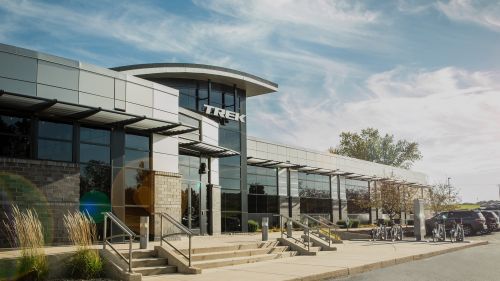WATERLOO, Wis. (BRAIN) — Following an emissions audit in the past year, Trek Bicycle announced Wednesday operational areas it will address to reduce its carbon footprint. WAP Sustainability Consulting conducted the audit to measure Trek's environmental impact.
Ten areas were identified in the brand's sustainability report:
- Reduce air freight — Will pledge to improve supply chain processes to reduce air freight mileage by 75% by 2024.
- Consolidate shipments to retailers — To address ground shipping emissions, a global consolidated shipping strategy is being devised, also by 2024. Mainland European retailers currently utilize a batched shipping strategy that cuts mileage required to move product.
- Increase reliance on renewable energy — By 2023, all Trek facilities globally will be powered by renewable energy. Currently, global headquarters uses a mix of 60.6% wind, 33.3% biogas, and 6.1% solar power. The California and New Jersey distribution facilities are 100% renewably sourced.
- Reduce corporate travel — In 2021, travel has been reduced by 50% of pre-pandemic levels, and it will continue to reduce plane travel moving forward.
- Increase reliance on alternative materials — A commitment to using recycled, recyclable or refurbished materials to build products. Today, 15 products are made entirely of reclaimed materials. For example, in partnership with Bureo, a group working to remove discarded fishing nets from the oceans, Trek is grinding down this ocean pollutant into reusable material used to create the water bottle Bat Cages present on Trek bikes. The material is present in several handlebar grips as well.
- Create zero-landfill manufacturing facilities — The goal is to become landfill-free by 2024 with efforts already in place in the U.S. manufacturing facility.
- Establish and protect new trails — The establishment of The Trek Foundation also was announced Wednesday, and it will provide support to develop trails and infrastructure for public use and protect land from development.
- Remove plastic waste from packaging — The use of new packaging for bikes and accessories in an effort to cut down on non-recyclable pieces, working toward a goal of plastic-free packaging by 2024. In one year, Trek removed 433,600 pounds of plastic packaging.
- Increase access to bike share — Since 2009, Trek-owned bike share system, BCycle, has reduced congestion and transportation-based carbon emissions in 35 cities, according to Trek. It is committed to accelerating that growth and expansion.
- Get more people on bikes — In the U.S. alone, a 1% shift from vehicle transportation to cycling would result in a carbon reduction about 17 times bigger than Trek's total global carbon footprint, according to the company, which is supporting causes that lobby for bikes, provide economic incentive to cities and individuals to choose sustainable transportation, and build better bike infrastructure.


